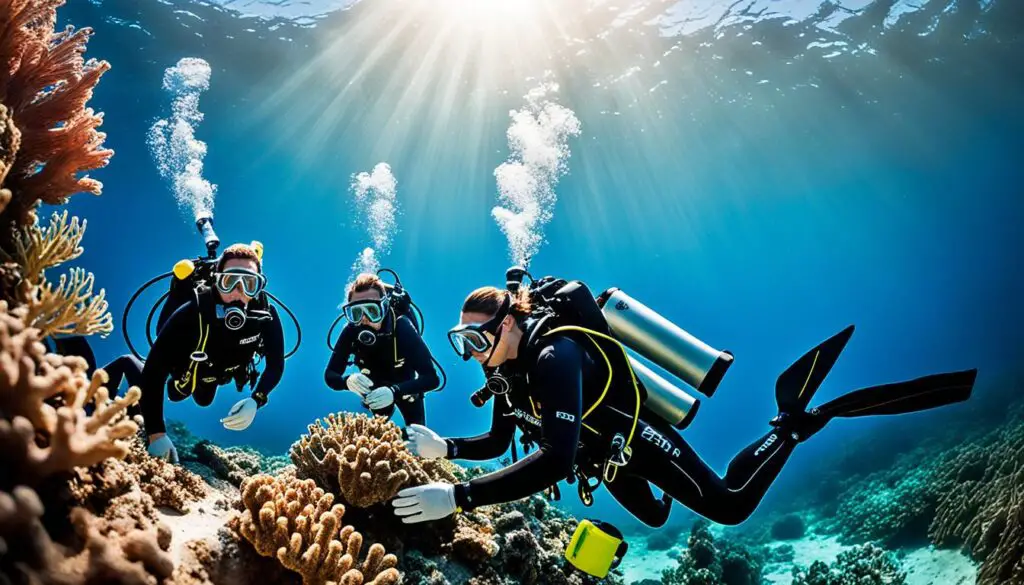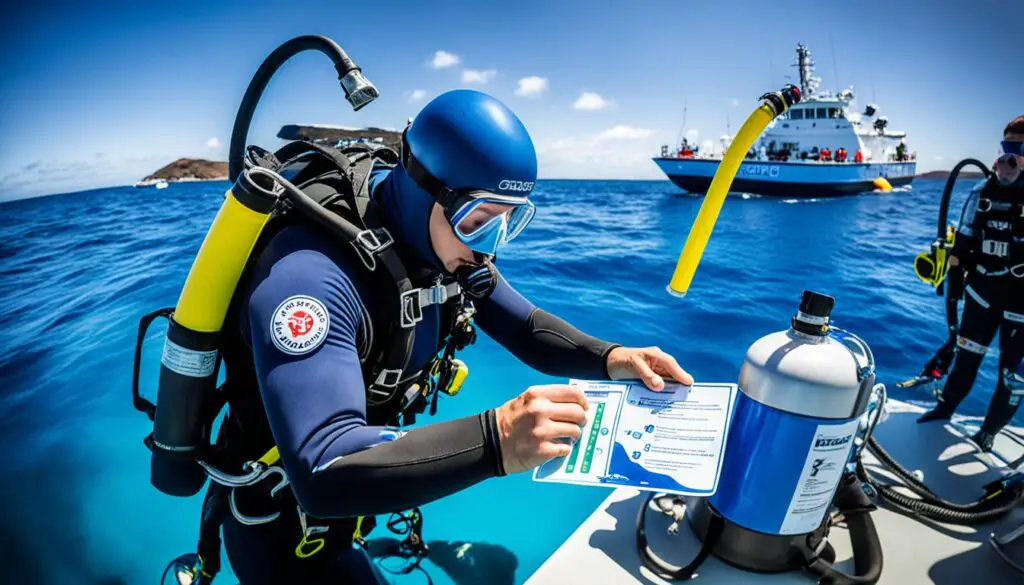Diving is thrilling, but your safety comes first. It doesn’t matter if you’re just starting or have many dives under your belt. There are key steps to keep you safe below the surface. This article offers advice from trusted sources like the Divers Alert Network (DAN) and experts. We will dive into important tips and alerts for an awesome and secure dive trip.
Key Takeaways
- Always focus on safety, no matter how much diving experience you have.
- Use advice from reliable sources such as DAN to guide your dives.
- Improve your safety by mastering correct diving skills.
- Keep up with the latest in diving safety for a fun yet secure journey.
- Have a blast diving safely with these expert tips.
Preparing for a Safe Dive
Before diving, getting ready is key. Dive safely by planning well and updating life-saving skills like CPR and First Aid. This ensures fun and safety under the waves.
- Review your health and fitness: Check your health before you dive. Talking to a doctor is a good idea. Do some tests to make sure you can handle the hard parts of diving.
- Refresh your diving skills: Keep your diving skills sharp by practicing. This includes things like staying level underwater, clearing your mask, and getting to the surface in an emergency. Doing this boosts your confidence and prepares you for the unexpected.
- Check your equipment: Your gear must work well for your dive to be safe. Look over your scuba gear carefully. Test things like your regulator, BCD, and dive computer. Fix them before diving if they need it.
- Update your CPR and First Aid skills: Diving accidents can rarely occur. Stay ready by brushing up on CPR and First Aid. Take a course or read up on the newest methods. This way, you can help if someone is hurt.
Preparation is everything in diving. Make sure you’re healthy, your skills are fresh, and you know how to respond in an emergency. This is how you keep your dive trip both safe and enjoyable.

Dive Preparation Checklist
| Step | Description |
|---|---|
| 1 | Review your health and fitness |
| 2 | Refresh your diving skills |
| 3 | Check your equipment |
| 4 | Update CPR and First Aid skills |
Safety Tips for Diving
Safety is key in every dive. I’ve learned this through my many dives. I want to share important safety tips. These include keeping your gear in good shape, honing your diving skills, and managing your air well.
1. Equipment Maintenance
Keeping your diving equipment top-notch is vital for your safety. You should always check and service your gear. This ensures it works well. Don’t forget to look over your regulator, BCD, and dive computer. If you find anything broken, replace it immediately. Well-maintained equipment makes for safer dives.
2. Practicing Diving Skills
Staying sharp on your diving skills keeps you safe. Regularly practice tasks like clearing your mask or using hand signals. These aren’t just for safety, but they also make talking underwater easier. Think about taking refresher courses to boost your skills. This way, you’ll be confident in your abilities.
3. Managing Air
Watching your air is key to safety in diving. Always keep an eye on how much air you use. This helps plan your dives better. Learn to breathe slowly to save air and stay down longer. Also, keep in touch with your dive buddy about your air. Good air management means fewer safety worries about air running low.
“Safety is not a matter of chance; it is a matter of choice. Equip yourself with the necessary knowledge, skills, and tools to dive safely every time.”
By using these safety tips regularly, you can dive with less risk. Always keep safety first, and keep learning to dive safely.

Staying Safe Underwater: Additional Tips
Staying safe underwater includes choosing the right dive centers. Look for places known for putting safety first. This way, you know they care about your well-being while diving.
Getting certified by trusted orgs like PADI and SSI is key. These certifications give you the skills and knowledge to dive safely. They prove you can handle different diving challenges. Being certified means you’re prepared to manage risks.
Using top-notch gear is crucial for safety. Masks, regulators, and wetsuits should be of good quality. They help make your diving more comfortable and safe. The right gear is made to last in the water and keep you prepared for any situation.
Also, take care of your health for diving. Stay physically fit and plan dives to safe depths. Always have a buddy with you. Remember to respect sea life and environment too. Listen to your instructors, drink enough water, and protect your skin from the sun. These steps will make your diving safer and more enjoyable.
FAQ
What are dive alerts?
Dive alerts are sounds or signals that divers use to chat underwater. They help grab attention, show if there’s a problem, or pass messages between buddies.
How can I stay safe underwater?
To be safe underwater, join in on dive planning and pick a good buddy. Keep your CPR and First Aid knowledge fresh. Also, make sure your equipment is working well.
Check your gear often and use a list before you dive. Learn basic skills like how to clear your mask and what hand signals mean. Remember to keep an eye on your air.
What other measures can I take to stay safe underwater?
For extra safety, choose dive centers known for being safe. Get certified by places like PADI and SSI. It’s important to have good diving equipment. Take care of your health and make sure your dives are at safe depths.
Always dive with a buddy and respect the sea and its creatures. Listen to your instructors and protect yourself from the sun. DAN insurance can help keep you safe during your dives too.
